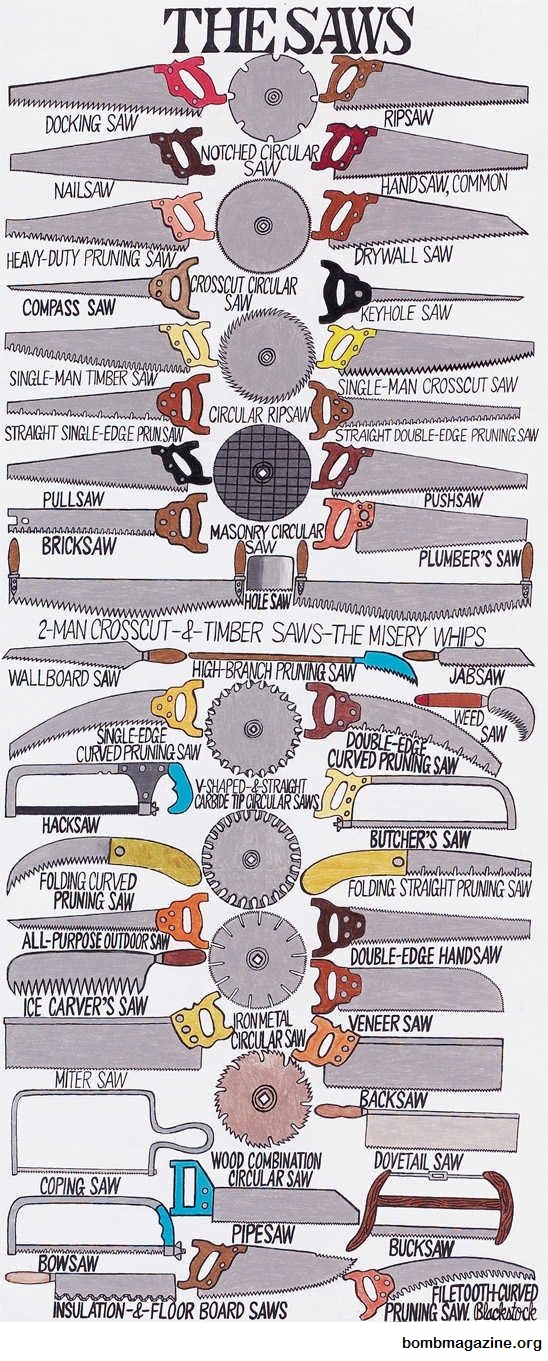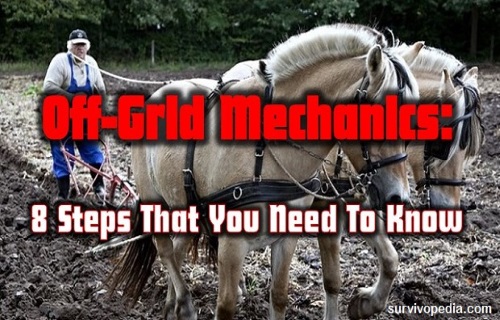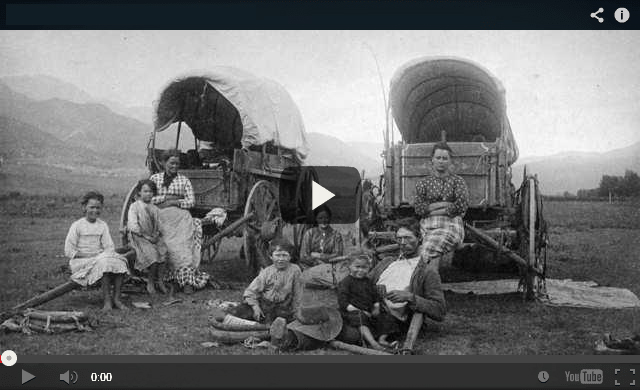What kind of vehicles and equipment do you use every day? What would you use instead in a SHTF world without the power grid?
When modern equipment won’t work anymore, the prepared have a plan in place. They know that with a little ingenuity and some elbow grease, they can get the job done. But a willingness to work won’t get you very far if you don’t have a pile of materials to work with.
Using What You Have
Modern-day preppers can learn a lot from the Depression era mentality of saving. I know that I have!
My Grandpa never threw anything away. When we first moved back to the family property, I thought his old junk pile was an eyesore. Tires. Old tractors. Tons of screws, bolts, and who knows what else. It was a huge pile of junk.
In today’s use it and toss it society, I simply couldn’t fathom why in the world my Grandpa kept this junk. I was embarrassed by it. I wanted to scoop it all up and take it to the dump. Thankfully, we couldn’t afford to do that.
Because over the years since we’ve been back, I’ve realized the true value of that junk pile. We’ve taken parts from equipment of old to fix what is broken. We’ve used scrap metal and junk to fill a need and solve problems around the homestead. And we’ve saved a lot of money.
That junk pile? I no longer view it as junk. I think of it as our insurance. You see—when the day comes that we can’t just go buy something, we’ll have a leg-up. We’ll have stuff to work with.
So if you don’t have a junk pile of your own, I’d recommend you start one. If you have property, just gather your junk in a remote corner. If you don’t, you’ll have to think creatively.
Can you save extra nuts and bolts in a drawer in the garage? Can you partner with a country friend to create a joint pile? Can you devote a closet to accumulating odds and ends?
As odd as it may seem to save junk, recycling and reusing becomes crucial when the modern economy is gone. You simply won’t be able to go buy what you need. You’ll have to use what you have.
1. Make a List!
What kind of automated systems are you running right now? Since each of us have a different lifestyle and processes, we won’t all need the exact same things.
To figure out what you need, you have to make a list. Grab a piece of paper and write down all of the systems you’re currently using that run on electricity and modern machinery. Here’s some common ones to get you thinking:
- Milking machines
- Automated sprinklers for the garden
- Tractor for plowing the field
- Rototillers for the garden
- Irrigation systems
- Lights
- Food storage (fridge and freezer)
- Laundry care
- Cooking
- Personal vehicles to get from place to place
- Heating a greenhouse to grow food year round
You’ll probably have more to add. Most of us are very dependent on modern innovations in today’s life. Now that you have your list, it’s time to start thinking through SHTF scenarios. Let’s work through a couple together:
Milking the Animals
How would you milk your cows if you had no power?
If you only have a couple of cows, you’ll probably be able to switch to hand milking. You might even get away with switching to once a day milking depending on how much milk your ladies are giving.

But, what if you have a whole herd and depended on a milker? What powers your machine milker? Do you know how your vacuum pump works? How will you clean the pieces if you don’t have running water?
Learn everything you can about the mechanics behind the automated systems you use every day. Read the manual. Study how the pieces work together. The more familiar you are with the parts and pieces, the more likely you’ll be able to repair it when the time comes. You’ll also know what sorts of extra parts to start stock piling.
RELATED : Pioneer Lessons From The Past That Can Save Your Life In The Future
Vehicles
When vehicles first came out, they were fairly simple machines. Most people could handle their own repairs. With today’s chips, computers, and complexity, that’s no longer the case.
These detailed systems often require specialized tools and scanning software to repair. There isn’t much you can do yourself without a large amount of mechanical knowledge. You might want to consider having an older vehicle around, just because it’s easier to work on.
They’re also more likely to run after an EMP. Here’s a great Survivopedia post on the best vehicles for an EMP event.
No matter what you’re driving, it’s essential that you start learning to repair it. If your car is broken, do some basic troubleshooting yourself. Every time you do this, you’re improving your mechanical ability.
If you take your car to the mechanic, learn all you can. Ask to see the broken part and where it was in your vehicle. You’ll learn more about your car, and start building a relationship with someone local with a mechanically minded skill-set. Or you can chose to grow animals for transportation.
Growing Food
You can’t just plop a variety of seeds in the ground and expect to magically grow enough food to feed yourself and your family for the entire year. There’s a lot of work between planting and harvesting. Many people rely on automated systems to do a portion of this work. From tractors to electricity or automatic watering systems, food production hasn’t escaped modern marvels.
Take a look at what you’re currently doing for food production. Do you run a rototiller over the ground each year? If so, it’s time to think about switching to a no-till method of gardening.
In this method, you prepare your soil initially before planting. Then you cover it with a thick layer of mulch. When it’s time to plant, you gently remove some of the mulch, and bury your seeds.
As your plants grow, the mulch holds in water, which is essential in a crisis situation. You continue to add compost and mulch to your garden. But, instead of digging the new stuff in, you just top-dress it by adding layer upon layer up on top.
This same method works in the field as well, though on a larger scale. Instead of a plow to prep the field for planting, you’d use a harrow. The impact on the land is a lot less, as harrows pierce the ground instead of turning it over.
Harrows are also more energy efficient since you can plant at the same time. That means only one trip around the field is needed instead of multiple.
RELATED : 24 Lost Gardening Tips from 100 Years Ago
Large Equipment
If your farm equipment fails, do you have a backup plan? Some people keep horses around, but horses aren’t the only animal that can work a field. Dexter cattle have been called a tri-purpose cow because they’re good for meat, milk, and work.
You’ll probably need to do some innovating to get your equipment to pull by animal instead of machine. Harnesses will be essential to keep your animal safe while working.
You can look for older equipment now, while you still have the benefit of used marketplaces. Horse drawn machinery are often cheaper than their modern counterparts, and they’re also easier to work on.
Video first seen on jamminjamy.
Watering
It’s not only the planting of the field that you should think about, it’s also the watering. Water typically runs on a pump. If you don’t have power, you’ll lose the accessibility of water. Gravity fed systems are one solution.
Look for an elevated area on your property where you can collect rainwater.
If you prepare a large container with a hose connector and a plug down low, you’ll be set to use the water. When it’s time to water, hook a hose up to the container. Gravity will force the water through the hose to where you need it. Just be sure to put the plug back on your system when you’re finished.
You can also build a series of wooden troughs to carry water from a waterfall or creek if you have one on your property. This one requires a little more mechanical know-how, as you’ll have to ensure your angles are correct. Otherwise the water won’t flow.
Harvest Time
To harvest your plants without machinery, you’ll need to learn how it was done in the past. If you’re growing your own wheat, instead of a combine you’ll need a scythe to cut it. You’ll also need to think through the threshing.
Only you know exactly what you’ll need to switch your automated systems over to manual ones. You’ll definitely need to have raw materials and tools on hand to keep your systems in good repair. But what can you do right now to start this process?
2. Stock Up on Printed Resources
There are plenty of books and details online that walk you through the systems you need. Now is the perfect time to stock up on printed research materials. After all, you won’t be able to do a whole lot of surfing the internet after the SHTF.
You won’t be able to learn everything in one sitting. That’s why having printed material is so beneficial. When you need it, you’ll be able to pull it out and learn on the go.
3. Develop a Repair or Reuse Mindset
When something breaks, it’s so easy to throw it away and buy another one. But, that attitude won’t get you very far in a crisis. Starting today, take time to learn about what’s broken.
If it’s something you were going to throw away anyways, you have nothing to lose. Examine the parts. See if you can pinpoint what failed. Then take it apart and see how everything fits together.
You might discover it was something simple that you can fix. If not, you gained valuable experience in troubleshooting and disassembly. Those skills will be crucial in the future.
Instead of throwing away things that break, see if you can come up with a more innovative solution. Can you pull the components and save them for an upcoming project? Can you hang onto the gears?
You might not have the space to save everything. That’s why it’s essential to have your list. What items will you use the most to keep your needed systems up and running?
4. Develop Your Creativity and Innovation
Instead of going out and buying something new, think creatively. Is there any other way to do what you need to do? Can you reuse something, or build a DIY model?
This will put your creative thinking skills to work. You’ll start thinking outside of the box. But just coming up with ideas isn’t enough. Innovation is the ability to put those skills to use to solve a problem.
5. Improve Your Mechanical Mind
Some people are naturally gifted in the area of mechanics. They’re tinkerers, always working on something. Others don’t have this natural ability. But, everyone can learn. If you’re not mechanically inclined, start asking questions. Watch what others do. Learn from them.
6. Carry Tools
You never know when you might need a screwdriver or a knife. If you aren’t currently carrying a multi-tool, start.
Put a basic repair kit in your car, and know how to use the tools in it. If you leave your vehicle in an emergency, you’ll be able to grab a couple of tools. Those may make the difference between you making it home or not.

7. Invest in Hand Tools
You’ll also want to build a solid supply of hand tools around your homestead. Think beyond the screwdriver and hammer. How would you cut firewood without a chainsaw? Pick up a hand saw that you can use if you need to.
Some have seen this problem coming for a long time and changed their entire way of life by going off-grid. They have found alternative sources such as solar, wind and diesel to power their homes and machinery. A majority of us, who have not gone off-grid, are making a concerted effort to avoid dependence on this ailing infrastructure and preparing for life without it.
8. Learn the Basics
While you can’t learn everything there is to know, you can learn a little about a lot of things. Here are some things to study that’ll help you be better prepared:
Every bit of knowledge and hands on mechanical experience you gain will help make you stronger in the future.
What’s your biggest struggle when it comes to off-grid mechanics? What systems would you have to replace? Could you survive off-grid, living the life our ancestors lived? Click on the banner below to find out more about their way of living and use their secrets for your survival.
Our grandfathers had more knowledge than any of us today and thrived even when modern conveniences were not available. They were able to produce and store their food for long periods of time. The Lost Ways is the most comprehensive book available. All the knowledge our grandfathers had, in one place.Here’s just a glimpse of what you’ll find in the book:
Table Of Contents:
Making Your Own Beverages: Beer to Stronger Stuff
Ginger Beer: Making Soda the Old Fashioned Way
How North American Indians and Early Pioneers Made Pemmican
Wild West Guns for SHTF and a Guide to Rolling Your Own Ammo
How Our Forefathers Built Their Sawmills, Grain Mills,and Stamping Mills
How Our Ancestors Made Herbal Poultice to Heal Their Wounds
What Our Ancestors Were Foraging For? or How to Wildcraft Your Table
How North California Native Americans Built Their Semi-subterranean Roundhouses
Our Ancestors’Guide to Root Cellars
Good Old Fashioned Cooking on an Open Flame
Learning from Our Ancestors How to Preserve Water
Learning from Our Ancestors How to Take Care of Our Hygiene When There Isn’t Anything to Buy
How and Why I Prefer to Make Soap with Modern Ingredients
Temporarily Installing a Wood-Burning Stove during Emergencies
Making Traditional and Survival Bark Bread…….
Trapping in Winter for Beaver and Muskrat Just like Our Forefathers Did
How to Make a Smokehouse and Smoke Fish
Survival Lessons From The Donner Party
Get your paperback copy HERE
Here’s just a glimpse of what you’ll find in The Lost Ways:
From Ruff Simons, an old west history expert and former deputy, you’ll learn the techniques and methods used by the wise sheriffs from the frontiers to defend an entire village despite being outnumbered and outgunned by gangs of robbers and bandits, and how you can use their wisdom to defend your home against looters when you’ll be surrounded.
Native American ERIK BAINBRIDGE – who took part in the reconstruction of the native village of Kule Loklo in California, will show you how Native Americans build the subterranean roundhouse, an underground house that today will serve you as a storm shelter, a perfectly camouflaged hideout, or a bunker. It can easily shelter three to four families, so how will you feel if, when all hell breaks loose, you’ll be able to call all your loved ones and offer them guidance and shelter? Besides that, the subterranean roundhouse makes an awesome root cellar where you can keep all your food and water reserves year-round.
From Shannon Azares you’ll learn how sailors from the XVII century preserved water in their ships for months on end, even years and how you can use this method to preserve clean water for your family cost-free.
Mike Searson – who is a Firearm and Old West history expert – will show you what to do when there is no more ammo to be had, how people who wandered the West managed to hunt eight deer with six bullets, and why their supply of ammo never ran out. Remember the panic buying in the first half of 2013? That was nothing compared to what’s going to precede the collapse.
From Susan Morrow, an ex-science teacher and chemist, you’ll master “The Art of Poultice.” She says, “If you really explore the ingredients from which our forefathers made poultices, you’ll be totally surprised by the similarities with modern medicines.” Well…how would you feel in a crisis to be the only one from the group knowledgeable about this lost skill? When there are no more antibiotics, people will turn to you to save their ill children’s lives.
If you liked our video tutorial on how to make Pemmican, then you’ll love this: I will show you how to make another superfood that our troops were using in the Independence war, and even George Washington ate on several occasions. This food never goes bad. And I’m not talking about honey or vinegar. I’m talking about real food! The awesome part is that you can make this food in just 10 minutes and I’m pretty sure that you already have the ingredients in your house right now.
Really, this is all just a peek.
The Lost Ways is a far–reaching book with chapters ranging from simple things like making tasty bark-bread-like people did when there was no food-to building a traditional backyard smokehouse… and many, many, many more!
Books can be your best pre-collapse investment.
The Lost Ways (Learn the long forgotten secrets that helped our forefathers survive famines,wars,economic crisis and anything else life threw at them)
Survival MD (Best Post Collapse First Aid Survival Guide Ever)
Conquering the coming collapse (Financial advice and preparedness )
Liberty Generator (Build and make your own energy source)
Backyard Liberty (Easy and cheap DIY Aquaponic system to grow your organic and living food bank)
Bullet Proof Home (A Prepper’s Guide in Safeguarding a Home )
Family Self Defense (Best Self Defense Strategies For You And Your Family)
Survive Any Crisis (Best Items To Hoard For A Long Term Crisis)
Survive The End Days (Biggest Cover Up Of Our President)
Drought USA (Discover The Amazing Device That Turns Air Into Water)
About Lisa Tanner
Lisa Tanner loves living life down on the family farm with her husband and their seven children. She spends her day tackling farm chores, homeschooling the kids, and growing her freelance writing career.In her free time, Lisa loves cooking, reading, and trying to learn new skills. You can find her blogging over at Maggie’s Milk.


